Key takeaways:
- A budget is a vital tool for financial management, helping individuals distinguish between needs and wants and plan for both regular expenses and unplanned costs.
- Budgeting encourages mindful spending, cultivates better financial habits, and fosters accountability toward personal financial goals.
- Teaching budgeting to kids early on instills valuable money management skills, promotes responsibility, and enhances their understanding of financial priorities.
- Making budgeting a fun and engaging activity can positively impact children’s perceptions of managing money while strengthening family bonds through shared financial discussions.

Understanding budgeting concepts
Understanding budgeting concepts begins with recognizing that a budget is simply a plan for your money. I remember when I first started managing my finances; I was surprised by how a simple spreadsheet could clarify my spending habits. Have you ever tracked your expenses? It’s a real eye-opener that helps you see where your money goes.
Next, I think it’s crucial to distinguish between needs and wants. Early on, I confused the two, often buying things I thought I needed. This led to some tough financial lessons. For example, I once spent a significant portion of my allowance on a gadget that turned out to be just a trendy toy. How often do we buy things that seem essential but aren’t? Recognizing this difference can help you prioritize your budget more effectively.
Finally, I’ve learned that flexibility is a vital aspect of budgeting. Life is unpredictable, and sometimes expenses arise that we didn’t plan for. I recall a time when my bike broke down unexpectedly, and I had to dip into my savings for repairs. It taught me that having a buffer within my budget is essential. How do you handle unplanned expenses? Embracing a flexible approach has made budgeting feel less like a chore and more like a practical tool for managing my financial future.
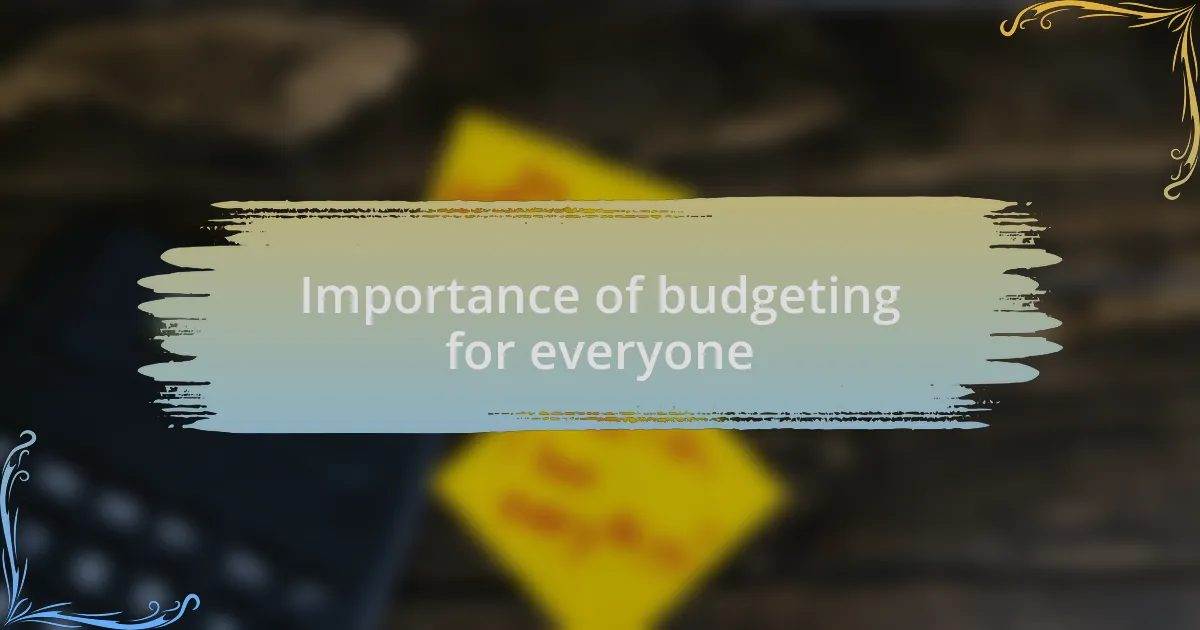
Importance of budgeting for everyone
Budgeting is important for everyone because it lays the groundwork for financial security. I remember a time when I didn’t budget properly; I ended up running out of money before the month was over. That experience compelled me to sit down and create a budget, which has since empowered me to spend mindfully and save for the future. How liberating is it to know your financial limits?
Moreover, budgeting helps cultivate better spending habits. I found that tracking my expenses made me more aware of my choices. For instance, I used to grab coffee every day without thinking twice; once I saw how much it added up, I started brewing my own at home. Have you ever noticed how small daily expenses can snowball into bigger financial concerns?
The practice of budgeting also fosters accountability. When I set financial goals, I hold myself accountable for meeting them. I remember setting a savings target for a new gaming console; seeing my progress week by week kept me motivated. Isn’t it satisfying to achieve what you set out to do? By budgeting, you’re not just managing money; you’re setting the stage for future aspirations.

How budgeting applies to crypto
When it comes to crypto, budgeting takes on a whole new layer of importance. I remember the first time I invested in cryptocurrency without a clear plan; I was drawn in by the hype and ended up making impulsive decisions that cost me. By establishing a budget specifically for crypto investments, I learned to allocate funds wisely and not to exceed my limits. Have you ever felt the rush of wanting to invest in a trending coin? That excitement can blind you if you’re not careful.
Crypto markets can be incredibly volatile, making it crucial to stick to a budget. I often allocate a specific percentage of my income for crypto, which allows me to invest without jeopardizing my overall financial health. This strategy not only protects me from making emotional decisions during market dips but also helps me stay focused on my long-term goals. Isn’t it empowering to know you have money set aside specifically for experimenting and learning about crypto?
Additionally, budgeting in crypto encourages a disciplined approach to trading. I track my investments closely, which has helped me differentiate between good opportunities and impulsive buys. For instance, before making a new investment, I ask myself if it aligns with my budget and overall financial strategy. Have you found that this kind of discipline leads to better outcomes in your investment journey? It certainly has for me.
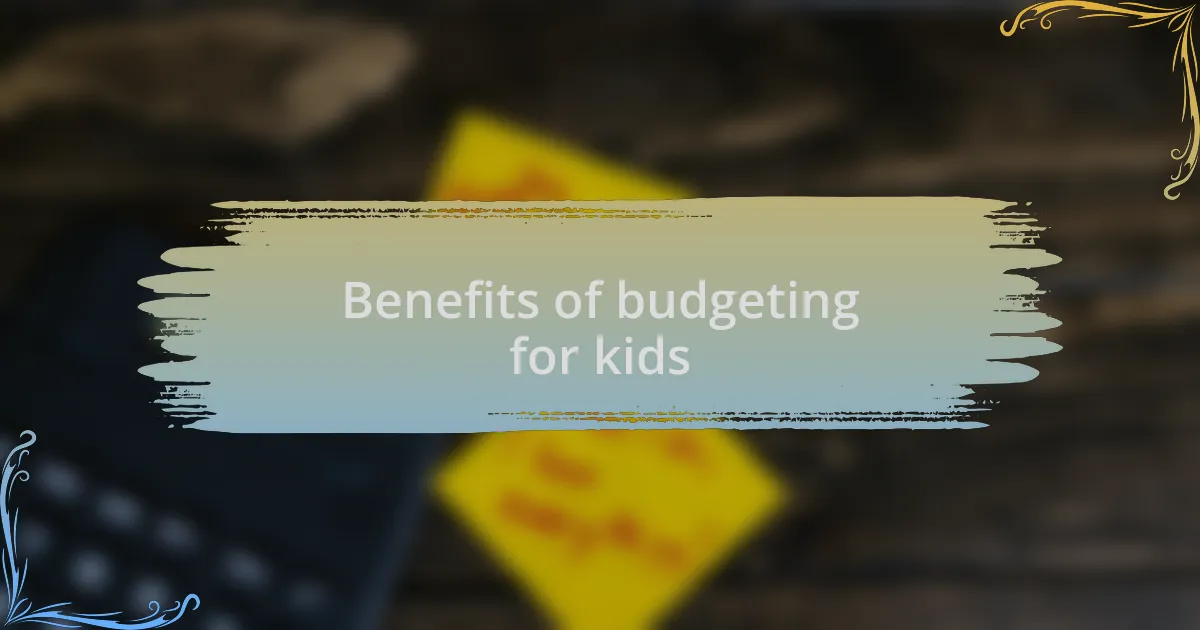
Benefits of budgeting for kids
Budgeting teaches kids valuable money management skills early on. I recall when my younger sibling received their first allowance; instead of splurging it all on toys, they decided to save a portion for a bigger goal. Watching them plan out their spending gave me insight into how setting financial priorities can foster a sense of responsibility and discipline.
Another significant benefit is that kids gain a deeper understanding of the concept of value. Once, my cousin wanted a specific game that was quite expensive. We sat down together, and I helped him create a simple budget that included his weekly allowance and some extra chores he could do for money. It was rewarding to see how excited he got while working towards that goal, realizing that every dollar counted.
Additionally, budgeting can empower kids to differentiate between needs and wants. I remember a time when I debated between grabbing a new video game or saving for a concert ticket. By sticking to my budget, I realized I could prioritize experiences that brought me joy over temporary purchases. Have you ever faced similar choices? It’s enlightening to see how budgeting can help shape our values and priorities.
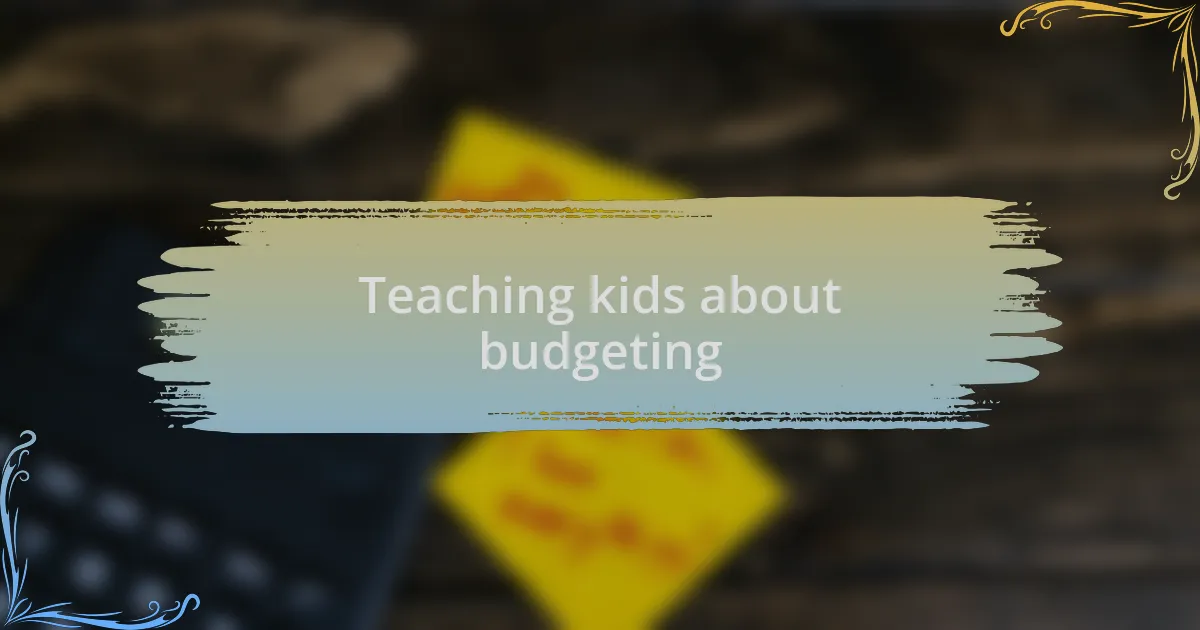
Teaching kids about budgeting
Teaching kids about budgeting is essential for nurturing their financial literacy. I remember the first time I sat down with my niece to help her manage her birthday money. We created a colorful chart where she could visually see her savings grow – it was a simple but powerful exercise that sparked her enthusiasm for money management. Seeing her excitement as she planned to buy a new bike gave me a sense of joy; budgeting truly makes financial goals feel attainable.
One thing I’ve observed is that kids develop a strong sense of ownership over their financial decisions when they budget. My friend’s son, excited after saving his allowance for a month, wanted to buy a new pair of sneakers. We chatted about his choices, and I asked him how he felt about potentially spending all his savings at once. It was fascinating to hear him voice his concerns about whether he’d regret not having money left for future treats. This moment made me appreciate that budgeting helps kids think critically about their spending habits.
Moreover, teaching budgeting can create opportunities for family bonding. I’ll never forget sitting around the kitchen table with my younger cousins, discussing ways to earn extra money through neighborhood chores. It wasn’t just about earning; it was an engaging conversation about making choices and setting goals. Have you ever shared such experiences with your family? It brought us closer, illustrating that financial discussions can be both educational and fun.
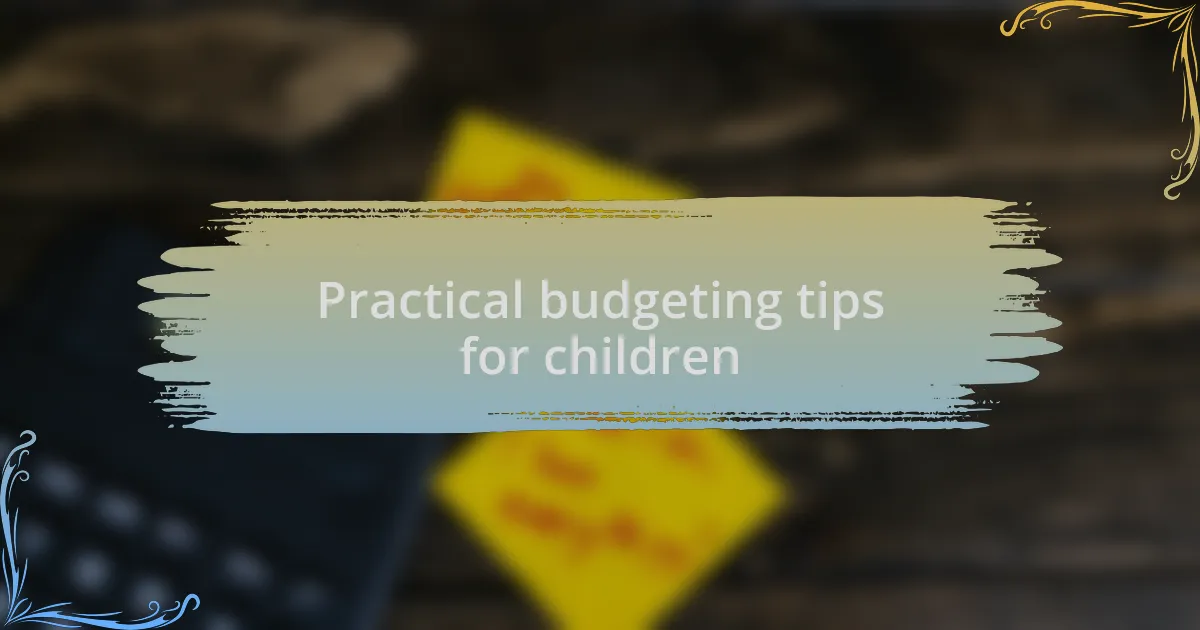
Practical budgeting tips for children
One practical tip I find invaluable is encouraging children to use a simple savings jar. When my daughter had some birthday cash, we decided to separate it into three jars: one for spending, one for saving, and one for sharing. This not only gave her a clear visual of how much she had but also instilled a sense of responsibility about her money. Have you tried this method? It allows kids to allocate funds for different purposes, which makes budgeting feel more achievable and engaging.
Furthermore, involve kids in planning small family outings with a budget in mind. I remember planning a trip to the local amusement park with my son, where we set a budget for the day. We discussed how to allocate money for tickets, snacks, and souvenirs. Watching him balance his desires with our budget was like witnessing a mini financial negotiation. How empowering it is for them to learn to prioritize spending!
Lastly, making budgeting a fun game can change everything. When I taught my niece to track her expenses using colorful stickers for each category, she was thrilled. She loved adding stickers for every time she saved or spent money wisely. This approached gamifies the budgeting process, making it a cheerful activity rather than a chore. Have you considered turning budgeting into a game? It’s a simple adjustment that can transform their perception and enjoyment of managing money.
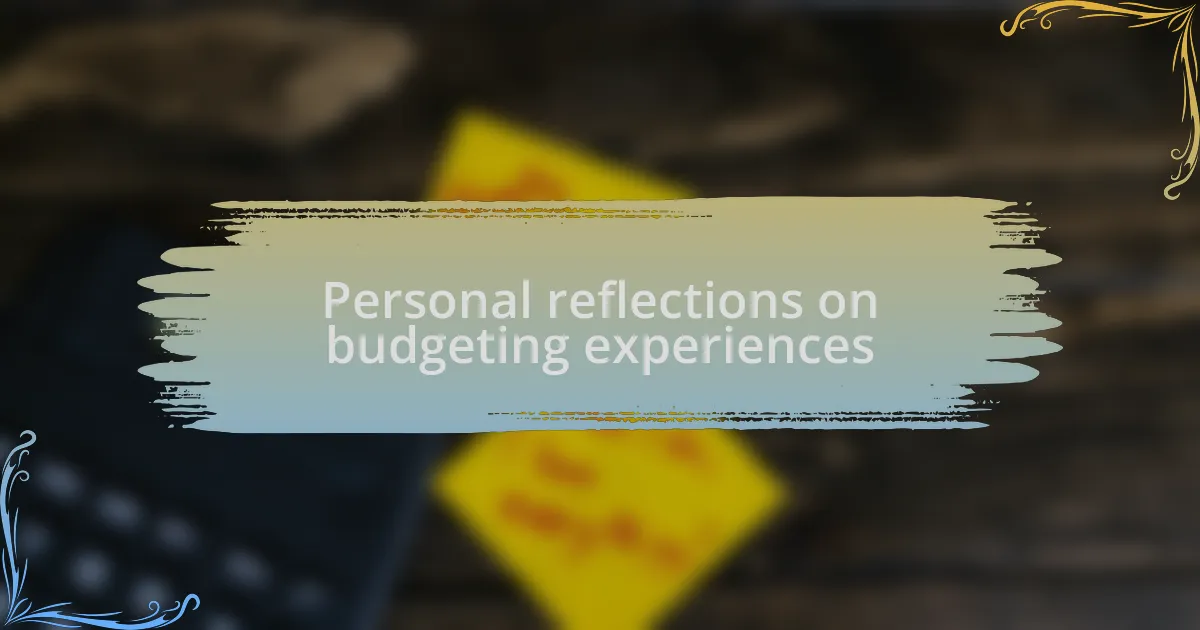
Personal reflections on budgeting experiences
Budgeting has been a journey for me, shaped by experiences that often caught me off guard. I remember when I first started managing my own finances as a teenager; it felt overwhelming, and I stumbled through it. I realized that tracking my expenses in a notebook wasn’t just about numbers; it became a reflective practice that taught me discipline and foresight. Have you ever had that moment where a small oversight led to a bigger lesson? For me, it was realizing that those daily coffee runs were silently draining my funds.
I still recall the first time I experimented with a budget. I set aside money for savings, but it was the section labeled “fun” that truly showcased my relationship with spending. When I hit the limit, I had to make tough choices between outings with friends or treating myself to something nice. This taught me that having a budget doesn’t mean restriction—it highlights my priorities. How does budgeting shift your perspective on spending?
Reflecting on those early days, I find that conversations about money can still be awkward, even with close friends. I once hesitated to discuss my budgeting struggles, fearing judgment or misunderstanding. But as I opened up, I discovered that many shared my concerns. It’s a reminder that budgeting isn’t just a solitary task; it can be an opportunity for connection and support. How do you engage with others about budgeting, and do those conversations lead to deeper insights?